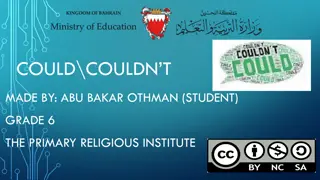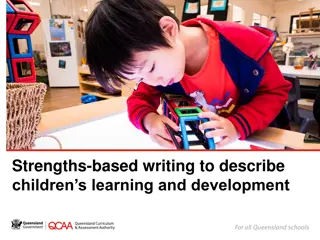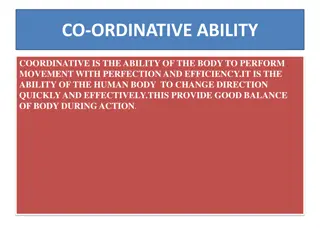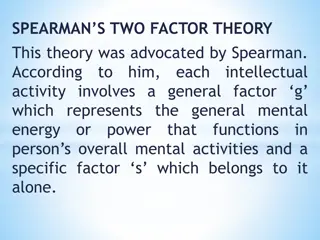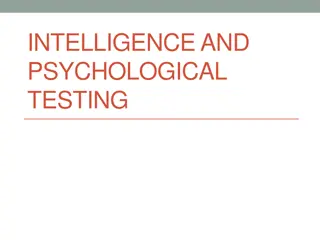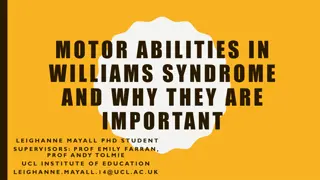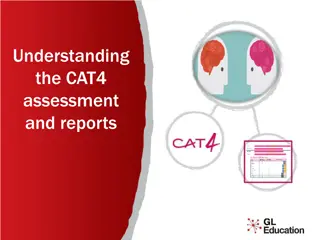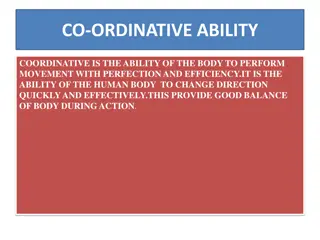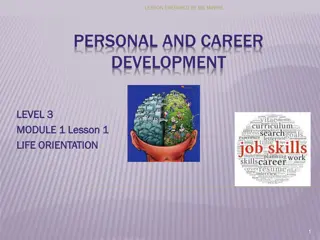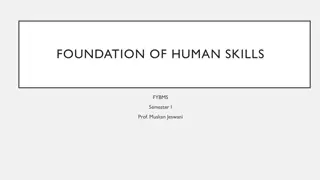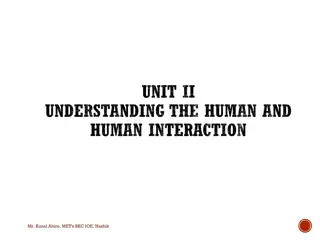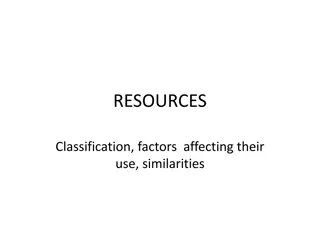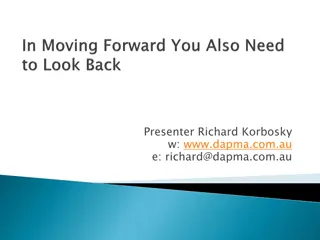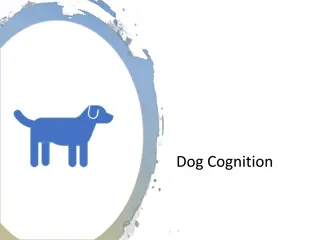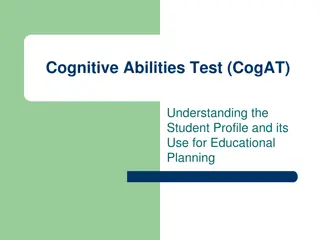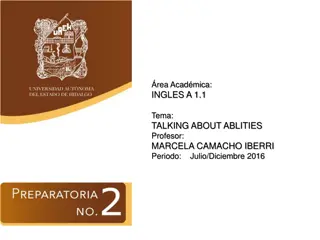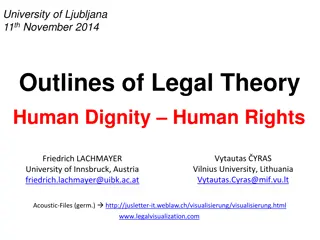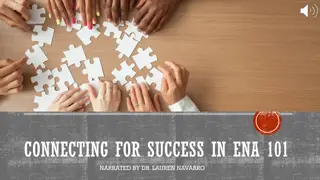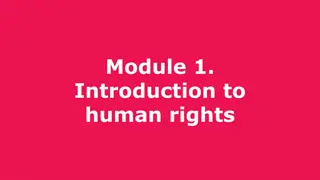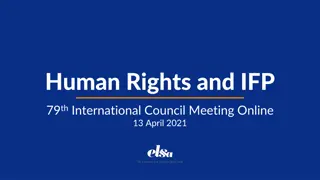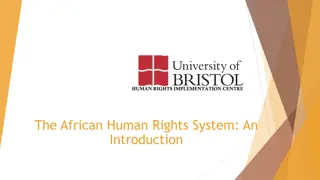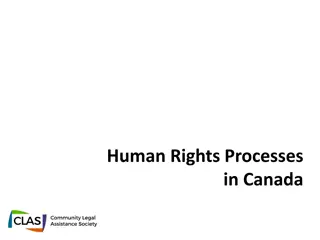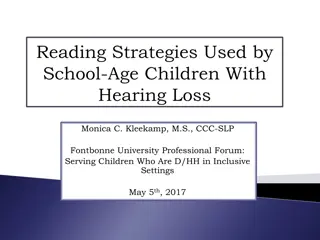Human Systems Integration in Technology Development
Human Systems Integration (HSI) is a crucial interdisciplinary process in systems engineering that integrates human factors to enhance system design, reduce costs, and optimize performance. This presentation by NASA experts delves into the benefits of HSI, the human readiness level metrics, and its
1 views • 23 slides
Factors Influencing Economic Growth: Human Capital and Capital Goods
Factors such as investment in human capital, capital goods, natural resources, and entrepreneurship play a crucial role in determining a country's economic growth. Human capital encompasses the skills and abilities of workers, while capital goods are the tools and equipment used to produce goods and
2 views • 28 slides
Approaches to the study of Human Rights
The Marxist perspective on human rights emphasizes social rights over individual rights, viewing the full realization of self within society. Marx connects bourgeois society with human rights, highlighting how exploitation under capitalism alienates individuals. In contrast, the Third World perspect
5 views • 19 slides
Understanding Neuropsychological Assessment: Insights and Applications
Neuropsychological assessment plays a vital role in understanding brain-behavior relationships. This process involves determining cerebral functioning, identifying dysfunction, and assessing cognitive abilities through a combination of interviews, observational data, and testing. The assessment aids
3 views • 33 slides
Overview of Human Factors and Automotive Standards YouTube Series
This YouTube series, led by Paul Green from the University of Michigan, covers human factors and automotive standards. It includes topics like introduction to standards, core human factors standards, automotive human factors standards, human-computer interaction standards, and SAE vehicle standards.
7 views • 9 slides
Understanding Human Rights in Queensland Government Work
The Human Rights Act of 2019 in Queensland outlines protected rights such as equality, freedom of expression, and fair trial. All public service employees must adhere to these rights, ensuring decisions and actions respect human rights. This act applies to everyone in the Queensland Government, with
2 views • 13 slides
Understanding the Basic Concept of Human Rights in Modern Jurisprudence
Human rights are natural and inalienable, essential for human life, based on universal principles. The concept of human rights is both simple and complex, requiring societal development and political will for implementation. Rooted in natural law theory, human rights have evolved from natural law to
1 views • 24 slides
Learning to Use "Could" and "Couldn't" for Past Abilities
Enhance your understanding of using "could" and "couldn't" to describe past abilities with examples and exercises. Practice completing sentences correctly and check your answers to improve your grammar skills effectively.
0 views • 7 slides
Understanding Strengths-Based Writing for Children's Learning and Development
Strengths-based writing focuses on identifying and emphasizing children's strengths and abilities to support their learning and development. This approach is inclusive, helping teachers discover strategies tailored to each child's unique strengths for enhanced success in learning. Principles and res
0 views • 21 slides
Understanding the Importance of Coordinative Abilities in Sports
Coordinative ability is crucial in sports for performing movements with precision and efficiency. It involves the body's capability to change direction swiftly, ensuring good balance during actions. This ability comprises various types such as orientation, reaction, rhythm, balance, adaptation, coup
0 views • 11 slides
Understanding Media Ecology: Impact of Communication Technology
Media ecology is a theoretical concept analyzing the influence of media and communication technology on human culture. Neil Postman, a prominent figure in the field, delves into how communication media affect human perception, understanding, and values. This study views media as environments shaping
4 views • 23 slides
Understanding Different Theories of Intelligence
Intelligence encompasses various abilities including adaptability, capacity for knowledge, reasoning, and more. Theories such as Spearman's two-factor theory and Sternberg's Triarchic Theory offer insights into different aspects of intelligence, highlighting factors like problem-solving abilities, c
1 views • 11 slides
Understanding Spearman's Two-Factor Theory
Spearman's Two-Factor Theory posits a general mental energy factor (g) and specific abilities factors (s), determining individual intelligence. The g factor is innate and crucial in various activities, while the s factor is acquired and varies per task. Despite criticisms regarding the oversimplific
0 views • 9 slides
Understanding Psychological Testing: Key Concepts and Applications
Psychological testing encompasses various measures to assess intelligence, abilities, aptitudes, personality traits, and more. These tests are standardized to ensure reliability and validity, providing valuable insights into an individual's psychological profile. Key concepts include mental ability
2 views • 18 slides
Motor Abilities in Williams Syndrome and Their Importance
Motor abilities play a crucial role in the developmental journey of individuals with Williams Syndrome. From simple reflex movements to fine and gross motor skills, these abilities impact daily living, academic achievements, and overall cognitive and physical growth. Research on motor skills in both
0 views • 20 slides
Understanding the CAT4 Assessment and Reports
CAT4, the Cognitive Abilities Test Fourth Edition, assesses students' abilities in verbal, quantitative, non-verbal, and spatial reasoning. It distinguishes between ability and attainment testing and is used to identify academic potential, understand student thinking, determine support needs, highli
1 views • 15 slides
Enhancing Coordinative Abilities in Sports: Types and Benefits
Coordinative ability is essential in sports for achieving movement precision and efficiency, with elements like orientation, reaction, balance, rhythm, and more playing key roles. Enhancing these abilities leads to improved performance, agility, and overall sports proficiency.
4 views • 11 slides
Understanding Personal and Career Development: Skills and Abilities
Explore the concept of personal strengths, abilities, and work skills as essential components of personal and career development. Learn the difference between hard skills and soft skills, and how they contribute to overall success in the workplace. Discover how to recognize, develop, and leverage yo
0 views • 17 slides
Understanding Human Nature and Individual Differences in Foundation of Human Skills
Explore the foundational concepts of human behavior, individual differences, and organizational culture in the study of human skills. Delve into topics such as human nature, personality, attitudes, intelligence, and learning in Prof. Muskan Jeswani's course. Understand the significance of inter- and
0 views • 11 slides
Enhancing Social Skills and Communication Abilities
This presentation focuses on improving social skills and communication, including non-verbal cues, body language, and eye contact. It highlights the importance of understanding social situations and provides insights on navigating interactions effectively. The session offers practical tips for indiv
0 views • 35 slides
Lifesaving and Swim Program Overview for Year 8 Students
In weeks 2 and 3 of Term 4, 2024, Year 8 students will participate in a compulsory Lifesaving and Swim Program, choosing from 5 different courses. These courses cover water safety, swimming skills, survival abilities, and include assessments to gauge proficiency. The program aims to enhance students
0 views • 9 slides
Understanding America Study: Cognitive Functioning Measures
The Understanding America Study (UAS) focuses on developing web-based cognitive functioning measures, including tests for fluid abilities, verbal skills, executive function, and processing speed. Utilizing data from about 9,000 panelists, tests like the Stop and Go Switch task are administered onlin
0 views • 26 slides
Evolution of Human Rights: From Ancient Times to Modern Era
Throughout history, ideas of rights and liberty have evolved, leading to the recognition of universal human rights in the modern sense. The concept of human rights can be traced back to significant historical events such as the English Bill of Rights, the Virginia Declaration of 1776, and the French
0 views • 7 slides
The Link Between Democracy and Human Rights
The core of democracy lies in promoting equal human worth and self-determination. There is a strong connection between human rights, democracy, good governance, and development. Democracy allows people to participate in decision-making, ensuring their views are heard. It upholds freedom, equality, f
0 views • 15 slides
Understanding Human Interaction in Interactive Systems
In the study of human factors in interactive systems, understanding the capabilities and limitations of users is crucial. This involves examining human input-output channels, memory, thinking processes, and problem-solving abilities. Humans interact with technology through senses like vision, hearin
0 views • 110 slides
Ensuring Inclusive Education in Norway
Norway's education system promotes equity by providing equal opportunities for all children regardless of gender, location, or learning abilities. With a focus on adaptive education, the system caters to individual needs and abilities, ensuring all students can achieve their potential. Special needs
0 views • 15 slides
Understanding Resources: Classification, Factors, and Similarities
Resources play a vital role in satisfying our needs and achieving our goals. They can be tangible or intangible, material or human attributes. This includes time, energy, knowledge, skills, abilities, and more. Human resources originate internally and are inherited with unlimited knowledge. Skills a
0 views • 13 slides
Interactive Mathematics Card Games for Secondary School Students
Many students enter Secondary School with a lack of key maths concepts such as fractions, decimals, and percentages, along with poor basic number skills and attitudes. The strategy presented aims to help parents, teachers, and students bridge these gaps using 12 different physical card games. These
0 views • 12 slides
Dog Cognition: Understanding the Advanced Cognitive Abilities of Dogs
Exploring the fascinating realm of dog cognition reveals how dogs exhibit advanced cognitive abilities beyond that of many non-human primates. From social learning to strong discrimination learning, contingency reversal, and object manipulation, dogs showcase remarkable intelligence that continues t
0 views • 35 slides
Understanding Cognitive Abilities Test (CogAT) for Educational Planning
The Cognitive Abilities Test (CogAT) is a benchmark test administered to third-grade students in the WCPSS for educational planning. The test measures verbal reasoning, math reasoning, and visual-spatial reasoning skills through different subtests and composite scores. These scores help in predictin
0 views • 17 slides
The Significance of Human Rights in the Modern World
Human rights are fundamental rights that belong to all individuals, are inalienable, indivisible, interconnected, and should be respected without prejudice. The Universal Declaration of Human Rights, adopted in 1948 after WWII by the United Nations, is a crucial milestone document emphasizing human
0 views • 5 slides
Talking About Abilities in English Language Class
In this English Language class taught by Prof. Marcela Camacho Iberri, students explore the use of the modal verb "can" to express abilities, requests, permissions, and possibilities. They also learn how to describe personal projects, aspirations, and talents. Through practical exercises and convers
0 views • 12 slides
Enhancing Transparency in Human Rights Performance Measurement
This information focuses on initiatives like the Human Rights Measurement Initiative (HRMI) that aim to provide new data for researching and advocating human rights issues globally. The HRMI project, founded in 2015, collaborates with various stakeholders and is funded by philanthropic grants. It em
0 views • 19 slides
Outlines of Legal Theory Human Dignity – Human Rights
Explore the significance of human dignity and human rights within legal theory, reflecting on their cultural, moral, and legal implications. Delve into the essence of human rights as an essential cultural achievement, contrasting the protection and denial of human images within different legal conte
0 views • 10 slides
Enhancing Writing Skills for Academic and Professional Success
Join ENA 101 to improve your writing abilities with guidance from Dr. Lauren Navarro. This course focuses on honing your writing skills through various activities, discussions, and feedback sessions to boost your confidence and produce high-quality essays. Embrace your unique experiences and storyte
0 views • 14 slides
Understanding Human Rights: Module 1 Overview
This module serves as an introduction to human rights principles, instruments, and monitoring mechanisms. It covers the definition of human rights, the Universal Declaration on Human Rights, key principles, and state obligations. Human rights are universal legal guarantees that protect individuals a
0 views • 21 slides
International Focus Programme: Human Rights and Technology Advocacy
The International Focus Programme (IFP) is actively engaging in advocating human rights and technology through various initiatives and campaigns. This includes organizing online meetings, webinars, surveys, and events to raise awareness about freedom of expression online, artificial intelligence, an
0 views • 8 slides
Overview of the African Human Rights System
The African Human Rights System encompasses various key elements such as the Organisation of African Unity, African Charter on Human and Peoples' Rights, African Court on Human and Peoples' Rights, African Union, and additional human rights-related treaties and protocols. This system aims to protect
0 views • 19 slides
Human Rights Processes in Canada: Legislation and Protections Explained
Understand the human rights processes in Canada, including the two general sources of human rights, human rights legislation, federal vs. provincial/territorial laws, and the specifics of the BC Human Rights Code. Learn about direct and indirect discrimination, duty to accommodate, and the areas pro
0 views • 12 slides
Understanding Reading Abilities in Deaf/Hard of Hearing Children
Monica Kleekamp discusses the delayed reading abilities of children who are deaf/hard of hearing and explores the correlation between reading levels and phonological awareness. Different approaches to reading instruction and research questions on reading strategies, narrative comprehension, and impa
0 views • 21 slides







